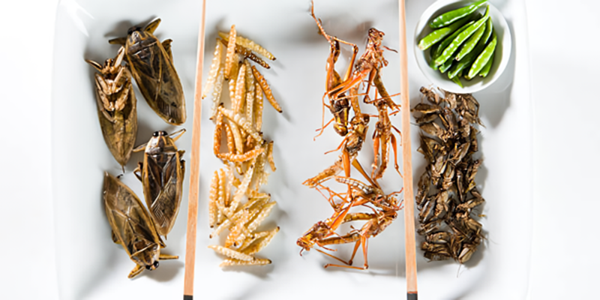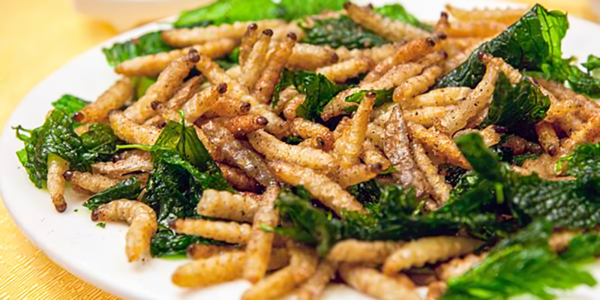The Role Of Edible Insects In Future Food Security: Are We Ready?
Insect-based protein accrues substantial gravitas as an avant-garde remedy for exacerbating global alimentary exigency. As the planetary populace burgeons to an estimated 9.7 billion by 2050, the necessity for proteic substrata is intensifying exponentially. The orthodox livestock husbandry paradigm may need to be revised to satiate this proliferating demand. Consequently, insect-based protein emerges as an audacious and avant-garde alternative, poised to transmogrify alimentary conventions.

Sustainable Food Alternatives: The Entomophagous Proposition
Sustainable food alternatives are sine qua non for perpetuating ecological homeostasis and ensuring posterity will possess access to salubrious sustenance. As a paragon of proteic efficacy, insects necessitate a tiny fraction of the hydric and terrestrial resources demanded by traditional livestock. Moreover, insect husbandry engenders a marked reduction in anthropogenic greenhouse effluvia. These characteristics position insect farming as the most ecologically sustainable food alternative.
Nutritional Prowess Of Edible Insects
Edible insects for nutrition transcend ephemeral dietary trends; they epitomize a trove of nutrient density. Teeming with first-rate protein, vitamins, and trace minerals, insects such as crickets proffer a proteic yield that surpasses even bovine flesh in gram-for-gram comparisons. Additionally, they are replete with indispensable amino acids, rendering them a quintessential panacea for ameliorating global nutritional deficiencies. Edible insects for nutrition are particularly efficacious in alleviating malnutrition, especially in regions where access to conventional proteic sources is precarious.
The Proliferation Of Insect-Based Protein
Insect-based protein is inexorably permeating the alimentary mainstream. From proteic energy bars to entomophagous pasta, edible insects are being astutely amalgamated into many culinary products. The urgent imperative for sustainable food alternatives and the burgeoning cognizance of the prodigious nutritional value inherent in edible insects precipitate this evolution. Although the praxis of entomophagy may seem anathema to some, the escalating enlightenment and assimilation of insect-based protein are steadily actually catalysts catalyzing its ascension to alimentary orthodoxy.
Edible Insects For Nutrition: Circumventing Cultural Reticence
Despite their myriad virtues, the ubiquity of edible insects is confronted with formidable cultural inertia. Innate aversions and the pervasive "yuck factor" remain substantial impediments. Nevertheless, these barriers can be surmounted with judicious pedagogical initiatives and astute marketing stratagems. Accentuating insect-based protein's ecological sustainability and nutritional preeminence could be pivotal in recalibrating public sentiment.
Delineating A Resilient Trajectory
Adopting sustainable food alternatives, such as insect-based protein, is non-negotiable to cement the future resilience of our alimentary systems. A concerted alliance among governmental entities, NGOs, and the private sector is indispensable in crafting policies that incentivize the cultivation and consumption of edible insects. Continued research and development should be directed toward optimizing entomological farming methodologies, safeguarding alimentary safety, and amplifying the accessibility and appeal of insect-based products within the consumer zeitgeist.
Paradigmatic Disruption In Agroecology
Sustainable food alternatives, particularly those rooted in entomoculture, embody a paradigmatic disruption in agroecology. With their wasteful resource consumption, conventional agricultural practices are increasingly untenable in the long term. Conversely, with its minimalistic resource requisites and prodigious protein yield, insect farming epitomizes ecological prudence. The scalability and resilience of insect-based protein production portend a revolutionary reconfiguration of global food systems, positioning it as an indispensable cornerstone in the architecture of future food security.
Arcane Reservoir Of Phytonutrients
Edible insects constitute an arcane reservoir of phytonutrients—bioactive compounds whose salubrious benefits extend far beyond the realm of macronutritional sustenance. Rich in antioxidative polyphenols, essential fatty acids, and chelated minerals, insects are an exemplary fulcrum of nutritional excellence within a health-optimized diet. The nutraceutical potency of edible insects for nutrition situates them as a venerated component within the burgeoning corpus of functional foods, catering to the discerning consumer who seeks integrative well-being and prophylactic nutrition.

Confluence Of Antiquity And Nutritional Modernity
Insect-based protein stands at the confluence of antiquity and modern nutritional science, amalgamating the ancestral praxis of entomophagy with contemporary scientific validation. In diverse ethno-gastronomic traditions, entomophagy—the consumption of insects as sustenance—has endured for millennia. Modern scientific inquiry reaffirms the nutritional profundity of insect-based protein, replete with high biological value protein, essential lipids, and bioavailable micronutrients.
Redefining The Metrics Of Resource Parsimony
Sustainable food alternatives are radically redefining the metrics of resource parsimony in the context of dietary production. Insect farming epitomizes this redefinition by offering an ultra-efficient protein source, demanding a fraction of the hydric, lithic, and trophic resources necessitated by traditional livestock farming. The diminutive ecological footprint of insect-based protein starkly contrasts with the egregious environmental toll of conventional animal husbandry.
Remediation Of Global Micronutrient Imbalances
Edible insects for nutrition offer an efficacious remediation strategy for global micronutrient imbalances. Endowed with an abundance of bioavailable iron, zinc, magnesium, and B-complex vitamins, insects are unparalleled in their capacity to rectify nutritional deficiencies. Integrating edible insects into dietary practices can mitigate widespread deficiencies, averting health disorders such as anaemia, immunosuppression, and cognitive impairments in regions where access to micronutrient-dense foods is limited.
Enhancing The Resilience Of Alimentary Systems
Insect-based protein is instrumental in fortifying the resilience of global alimentary systems. Unlike conventional livestock, vulnerable to zoonotic epidemics and environmental perturbations, insects exhibit remarkable adaptability to climatic and ecological fluctuations. This intrinsic resilience positions insect farming as a reliable and sustainable source of protein, even amidst the vicissitudes of global change.
The Pillar Of Future Food Sovereignty
Sustainable food alternatives are the bedrock of future food sovereignty, wherein communities assert autonomy over their alimentary production through ecologically sustainable practices. Insect farming uniquely suits small-scale, decentralized operations, empowering communities to reduce reliance on external food supplies and bolster local food security. This decentralized model is vital in regions susceptible to food insecurity, where sustainable food alternatives like insect-based protein can provide a resilient and locally sourced nutritional bastion.
Augmenting Global Public Health Paradigms
Edible insects for nutrition hold immense potential in augmenting global public health paradigms, particularly in underprivileged and developing regions. Governments and NGOs can tackle malnutrition head-on by integrating insects into public health initiatives, such as school nutrition programs and community feeding schemes. The nutrient density and economic accessibility of edible insects make them an ideal intervention for enhancing diet quality among vulnerable populations.
Conclusion
The seminal role of edible insects in fortifying future food security is unequivocal. Insect-based protein proffers an eco-centrically sound and nutritionally opulent remedy to the looming alimentary crisis. However, the odyssey toward widespread societal acceptance is merely inchoate. By assiduously addressing cultural predilections and vigorously championing the manifold benefits of edible insects for nutrition, we can expeditiously advance toward an alimentary future with sustainability and resilience.